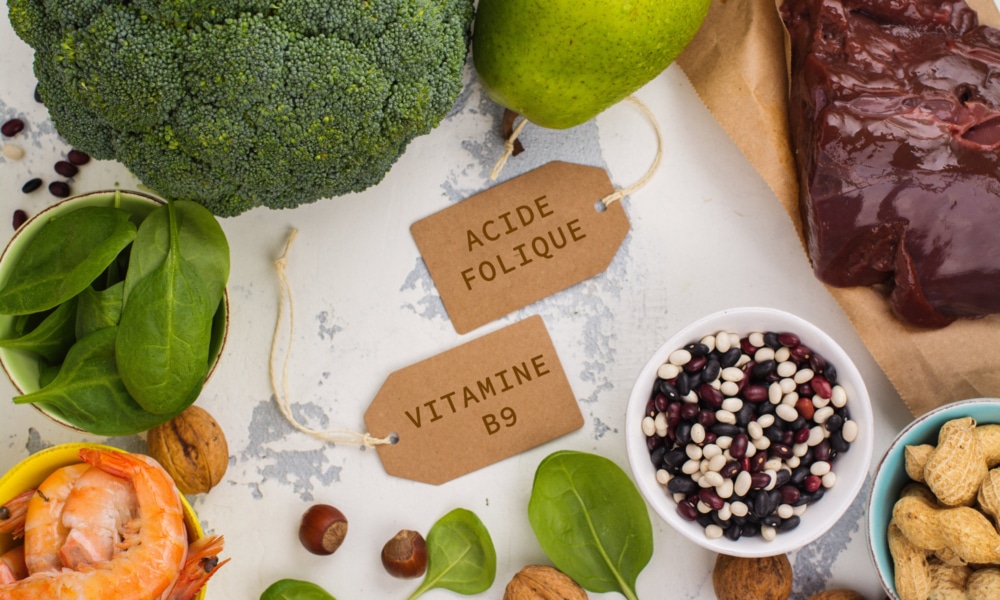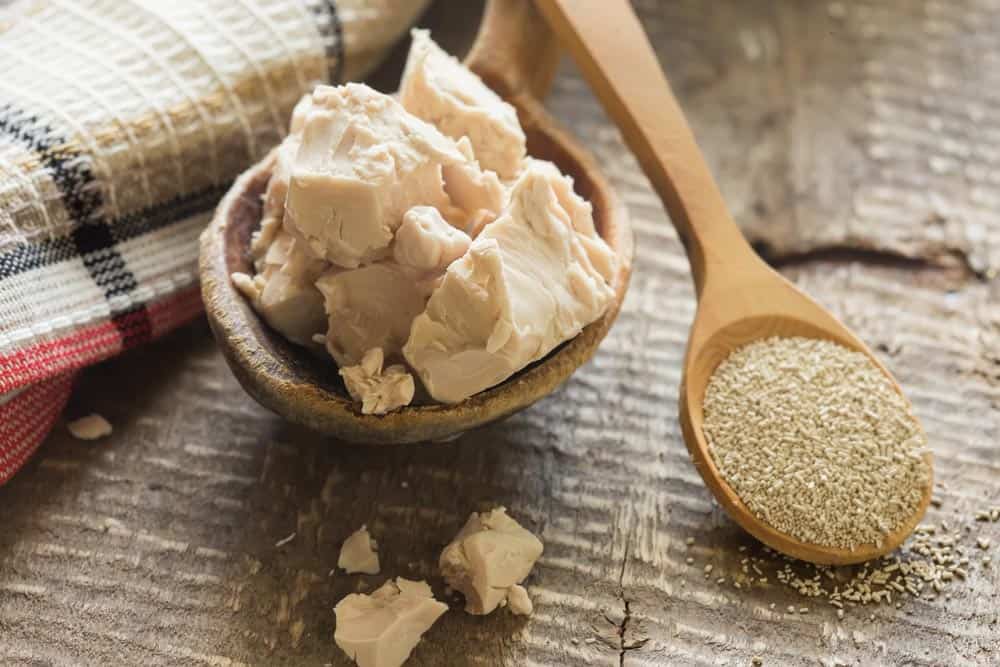Indispensable during the pregnancythe vitamin B9 guarantees the baby's health and prevents certain malformations. In addition to this essential role, the folatesthe natural form of the vitamin B9are also involved in cell maturation and renewal of the organism.
But beware: most of the cereal products that are legion in today's Western diet, as well as some multivitamins, use a synthetic, unnatural form of vitamin B9. These are folic acid. And its action could be counter-productive, not to say harmful, for the body!
But before tackling this controversial subject, let's take a look at the precise roles played by vitamin B9 in its natural form in the body. In what foods is it found? What are the risks of vitamin B9 deficiency or excess, whether in its natural or synthetic form? Finally, is there a vitamin B9 supplementation from natural sources? That's what we're going to look at in this chapter, which is absolutely central if you want to take back control of your health!

Characteristics of vitamin B9
Like all vitamins vitamin B9 is water-soluble. It comes in two forms: folateswhich are the natural form, and folic acida form of vitamin B9 synthesized and used in the supplementation of certain multivitamins, or, for example, certain food products enriched with vitamin B9like some cereals breakfast products.

The role of vitamin B9 in the body
Vitamin B9 is essential for the production of genetic material (DNA, RNA) and amino acids essential for cell growth. It is also involved in the formation of red blood cells, the maintenance of the immune system, the functioning of the nervous system and the healing of wounds and injuries.
This content is part of the guide Blooness, the guide to the ideal human diet, the summary of which you can find here 🌱🥑
The body also needs vitamin B9 to produce new cells, especially during childhood, adolescence and pregnancy.
Combined with vitamin B12, it reduces blood levels of homocysteine, a compound which, in excess, can promote cardiovascular disease.
French-speaking subscribers will receive the newsletter in French, and all others will receive an English version.

In pregnant women, vitamin b9 is essential for fetal life during the 4ème week until neural tube closure. It ensures the proper formation of the fetal nervous system. Thus, the vitamin B9 supplementation is often recommended for women who wish to have a child. to prevent neural tube defects in newborns. Neural tube defects are an extremely serious type of congenital malformation affecting the brain, spinal column and/or spinal cord. They can lead to nerve damage, learning disabilities, paralysis and death.
Last but not least, vitamin B9 also combats the harmful effects of smoking, and may help prevent certain types of cancer.
However, vitamin B9 is the subject of controversy in the nutrition world, as many manufacturers use it as an ingredient in their products. folic acid as a vitamin supplement, which could be harmful to health.
Folates VS Folic acid
As we said earlier, folates are a natural form of vitamin B9found in the diet. The digestive system is capable of metabolizing all forms of folate.
On the contrary, folic acid is an invention to obtain more stable vitamin B9. Indeed, natural folates in food oxidize very quickly contact with light, heat, hot water (hence steam cooking), glucose or fructose, and simply exposure to oxygen.
In other words, the longer a vegetable has been picked, the longer a dish or juice has been exposed to light via transparent packaging, and to heat, or cooked, the more likely it is to be low in naturally-occurring vitamin B9.
For these reasons, folic acid - which is much more stable - was synthesized. The problem, is that this form of vitamin B9 is much less well assimilated by the bodyand is found in excess, in a non-metabolized form.
It may even be that a excess circulating folic acid in the body can promote the development of cancers. This could explain the contradictory results of studies on vitamin B9: some tend to show that it reduces diseases such as cancer, while others show the opposite. It is therefore the source of vitamin B9 that is responsible for these paradoxical results.
Folic acid supplementation combined with a diet rich in folic acid-enriched cereals could be a particularly dangerous cocktail for the body.
In practice, a daily dose of folic acid higher than the recommended 200μm (200 micrograms) would not bode well for health, and it would be better to do without it, in order to respect the precautionary principle.
Conversely, eating folate-rich foods has so far shown no harmful effect on health.
Foods rich in vitamin B9
Visit offalthe pulses and some vegetables are particularly rich in vitamin B9. However, cooking, freezing and canning can reduce the amount of this vitamin in vegetables.

Vitamin B9 content (in µg per 100 g of food)
Here's a list of foods rich in vitamin B9. We have deliberately not included cereals enriched with folic acid, for the reasons given above.
Foods highlighted in bold are those that are simultaneously the richest in vitamin B9 and the healthiest.
Poultry liver: 650µg
Lamb liver: 400
Veal liver: 350
Beef liver: 259
Toasted sunflower seeds: 238
Raw spinach: 194. Cooked spinach: 125
Kale: 190
Cooked lentils: 181
Cod liver: 188
Kombu seaweed (kelp): 180
Chickpeas: 172
Raw collards: 166
Egg: 166
Pork liver: 163
Fresh asparagus: 149
Raw Nori seaweed: 146
Scarole: 142
Brussels sprouts, Broccoli: 113
Goat's cheese: 80 - 108
Parsley, mint, dandelion: 110 - 198
The best thing to do is to consume in general green vegetables and legumes as side dishes.
Ideal dosage of vitamin B9
Vitamin B9 requirements are around 300 μg/d for both men and women.
Intake can sometimes exceed 400 µg during pregnancy in women.
|
Age/State |
Recommended folate intake (µg) |
| Infant 0 to 6 months |
65 |
|
Baby from 7 to 12 months |
80 |
| Children aged 1 to 3 |
100 |
|
Children aged 4 to 8 |
200 |
| Children aged 9 to 13 |
300 |
|
Teenagers aged 13 to 15 |
300 |
| Adolescents over 16 |
330 |
|
Pregnant women |
600 |
| Nursing mothers |
500 |

The risks of vitamin B9 deficiency
Vitamin B9 deficiency is common, especially in pregnant women. Folate deficiency is often the cause of a number of disorders, including anemia, cardiovascular disease, depression, arthritis, mental disorders (schizophrenia), hypertension and diarrhea.

Deficiency can also be observed in people whose diet is unbalanced or too low in fruit, especially vegetables and legumes. Poor assimilation can also occur, especially among the elderly and alcoholics. Vitamin B9 deficiency can lead to macrocytic anemia, digestive disorders and mucous membrane damage.
High doses of vitamin B9 can also cause neurological disorders. That's why it's important not to take high-dose supplements.
Should I take vitamin B9 supplements?
Diet alone may not provide the body with enough vitamin B9, for two reasons:
- The first is that not everyone has the opportunity to optimize their diet to consume the right amount of folates every day, or at least over a week.
- The second is that a large proportion of the population is deficient in the activity of an enzyme, MTHFR, responsible for metabolizing vitamin B9.
Therefore, dietary intake is insufficient for a large proportion of the population.
Certain situations may lead the doctor to recommend folic acid supplements. These include pregnant and breast-feeding women, people who have undergone stomach surgery, alcoholics, people subject to continual stress, continuous diarrhea, impaired kidney function, prolonged fever, liver disease, anemia or intestinal disease.

It is generally recommended that pregnant women take at least 400 to 800 µg of vitamin B9 per day during supplementation. For the rest, the dosage and duration of supplementation vary according to the individual case. In all cases, the dose of 1mg (or 1,000µg) per day should not be exceeded without medical advice.
The problem is that most patients will supplement with folic acid. And as we saw earlier, not the best form of vitamin B9. According to some scientists, it's even dangerous.
However, there are better forms of vitamin B9 than folic acidincluding stable natural folates synthesized in the laboratory. These new forms of vitamin B9 are already pre-activated and directly usable by our cells. They are therefore even more effective than the natural vitamin B9 found in foods. They have not been favored over "standard" folic acid because these forms are more expensive and more complicated to synthesize.
They come in three forms:
- Calcium L-5-Methyltetrahydrofolate (also known as calcium L-methylfolate)
- Calcium folinate (or calcium 5-formyltetrahydrofolate salt), found in the drug LEDERFOLINE
- (6S)-5-methyltetrahydrofolate (or (6S)-5-methyltetrahydrofolate glucosamine salt), registered under the name Quatrefolic®.
These three forms of vitamin B9 are the best in terms of bioavailability, and are not as dangerous as folic acid.. To be even more precise, Quatrefolic® appears to be the most bioavailable and stable of the three forms. You'll find this form in certain high-quality premium multivitamins. Other qualitative multivitamins use one of these three natural forms, such as L-methylfolate.which will also do the trick.
Conclusion
If we had to sum up the vitamin B9 controversy in one or two recommendations, we'd have to say focus on green vegetables and legumes which, in addition to their natural vitamin B9 content, are also the healthiest side dishes.
And for those for whom supplementation is recommended - athletes, pregnant women, etc. - it is strongly recommended to turn to a quality supplementation, by checking the molecules used, in particular one of the three forms mentioned above.
Next chapter: vitamin B12.
Previous chapter: vitamin B8.



